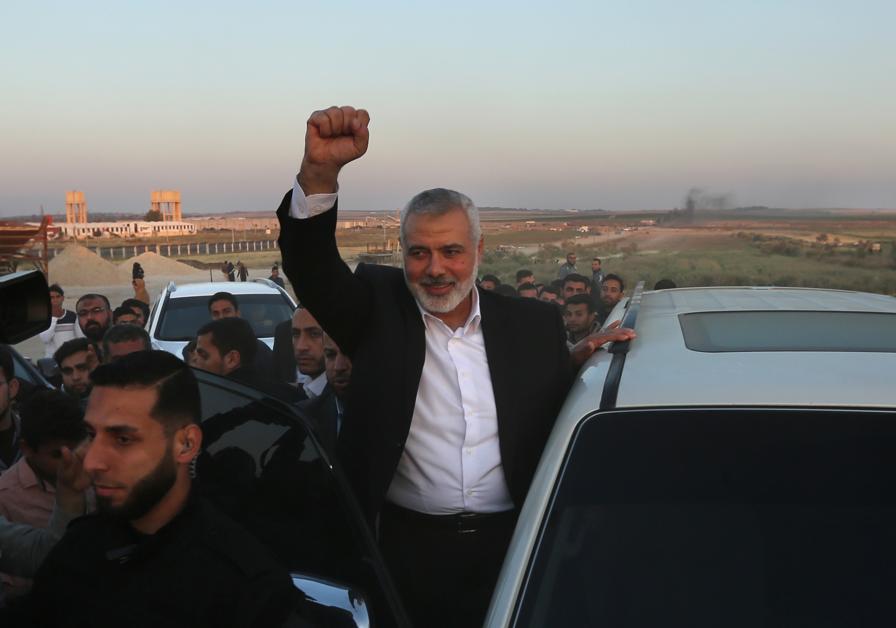
GAZA CITY — Israel’s prime minister and the leader of Hamas, the militant group running Gaza, staked out tough positions Monday, making deescalation on the Israel-Gaza border in the near future unlikely.
Since late March, 26 Palestinians have been killed and hundreds wounded by Israeli fire in mass border protests led by Hamas, but also driven by widespread desperation over the territory’s decade-old border blockade by Israel and Egypt.
The protests are seen, in part, as an attempt by Hamas to break the blockade.
Hamas leader Ismail Haniyeh renewed a pledge Monday that the marches would pave the way for a return of Palestinian refugees and their descendants to what is now Israel.
‘‘We will return to Palestine, our villages, and Jerusalem,’’ Haniyeh said in a fiery speech at one of five protest camps set up along the border.
He stopped short of threatening a mass breach of the border, though another Hamas leader has done so in recent speeches.
Israel has accused Hamas of using the protests as a cover for carrying out attacks and bringing infiltrators into Israel. It has said some of those at the border tried to damage the fence, planted explosives, or hurled firebombs.
Prime Minister Benjamin Netanyahu of Israel visited Sderot, an Israeli community near Gaza, and said Israel’s top priority is its security.
‘‘We have one clear and simple rule and we seek to express it constantly: If someone tries to attack you — rise up and attack him,’’ Netanyahu said. ‘‘We will not allow, here on the Gaza border, them to hurt us. We will hurt them.’’
Israel has said it has the right to defend its sovereign border, amid mounting international expressions of concern about the escalation of the past 10 days.
Israel’s military said Monday night that it is ‘‘thoroughly’’ investigating after media broadcast video that appears to show a soldier shooting a Palestinian near the Gaza fence as audio of other soldiers are heard cheering when the individual falls.
The circumstances of the shooting are unclear. Israeli media said the footage was taken during the recent border clashes. The military said the incident apparently occurred several months ago.
On Sunday, the chief prosecutor for the International Criminal Court said Israel’s ‘‘violence against civilians — in a situation such as one prevailing in Gaza’’ may constitute war crimes. But in an apparent reference to Hamas, she also said ‘‘the use of civilian presence for the purpose of shielding military activities’’ could also be a war crime.
Haniyeh said protests would continue. Since March 30, there have been two mass demonstrations on Fridays, and another one is expected this Friday.
Hamas’s promise of a ‘‘Great March of Return’’ has particular resonance in Gaza, where two-thirds of 2 million residents are descendants of refugees, uprooted in the 1948 war over Israel’s creation.
Israel and Egypt have enforced a blockade since Hamas, an Islamic militant group, overran the territory in 2007. Hamas has fought three cross-border wars with Israel, and its political charter calls for Israel’s destruction.
Earlier Monday, Israeli fighter jets struck a Hamas target in Gaza, in response to two explosive devices found near Israel’s border with the territory, the military said. No injuries were reported in the strike.
Also Monday, the Health Ministry in Gaza said a 45-year-old Palestinian man has died of his wounds after being shot in the legs by Israeli troops during a protest late last month.
The man’s death brings to 32 the number of people killed by Israeli fire since March 30, including those killed during the protests at the Gaza-Israel border. Among the others killed were Palestinian gunmen who had attempted to cross into Israel and two militants killed by Israeli forces.
The Israeli military said it struck a Hamas ‘‘terror target’’ in a military compound in Gaza early on Monday. On Sunday, the military said two explosive devices were found near Israel’s border with Gaza, hours after three Palestinians from Gaza crossed briefly into Israel.
Hamas, considered a terrorist group by Israel and its Western allies, has controlled Gaza since ousting forces of internationally recognized President Mahmoud Abbas in 2007.
Abbas said Sunday that unless he gets full control over the Gaza Strip, including Hamas’s weapons, he will ‘‘not be responsible for what goes on’’ there.
His comments were another setback for months of US-backed Egyptian efforts to negotiate a deal that would sideline Hamas and enable Abbas’s self-rule government to return to Gaza. Recent talks between Abbas and his rivals failed, mainly because Hamas refuses to disarm.
Abbas told leaders of his Fatah movement he has informed Egypt of his demands and is waiting to hear back.



